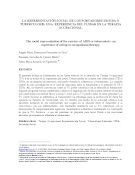Resultados: visualización detallada
Registro 2 de 2 para la búsqueda Autor Almeida Y Institución Biblioteca Universitaria de Chile
The social representation of the carriers of AIDS or tuberculosis: an experience of caring in occupational therapy
Ângela Maria Bittencourt Fernandes da Silva; Terapeuta Ocupacional, Doutoranda do Curso de
Fernanda Carvalho de Queiroz Mello; Pesquisadora do Programa Acadêmico de TB/Ins
Nébia Maria Almeida de Figueiredo; Professora Titular de Fundamentos de Enfermag
2009
-
Datos de edición
Revista Chilena de Terapia Ocupacional; No. 9 (2009): Diciembre; Pág. 133 - 147
Universidad de Chile - Tipo de Documento Prensa y Revistas
- Materia Terapia ocupacional, representación social, tuberculosis pulmonar, sida, inclusión social; occupational therapy, social representation, pulmonary tuberculosis, aids
-
Descripción
This work builds upon the theories of care in Occupational Therapy (OT) and the theory of social representation. Developed in clients with tuberculosis (TB) and AIDS in a university hospital, aiming to assess adherence to treatment. The central question of this research is the relational character between the treatment and the carrier of TB or AIDS. That objectively characterized as the OT can help with treatment adherence. Some questio ...This work builds upon the theories of care in Occupational Therapy (OT) and the theory of social representation. Developed in clients with tuberculosis (TB) and AIDS in a university hospital, aiming to assess adherence to treatment. The central question of this research is the relational character between the treatment and the carrier of TB or AIDS. That objectively characterized as the OT can help with treatment adherence. Some questions were answered: How is the organization of the customers' environment facts constituting their physical and social? Can it be that the OT can take care of these people? OT may facilitate adherence to treatment? The strategy for data production was supported in Creativity Workshops, with 12 clients, through artistic activity. Patients spoke of the feelings that arise in the relationship between development andliving with their diseases. The results showed that the OT contributes with decrease of aggressive behavior by facilitating treatment compliance. The conclusion is that the OT, encourages people to prepare to cope with adverse events causing treatment adherence.El presente trabajo se fundamenta en las bases teóricas de la atención en Terapia Ocupacional (TO) y en la teoría de la representación social. Desarrolladas en clientes con tuberculosis (TB) oSIDA, en un hospital universitario, evaluando visando la adherencia al tratamiento. La cuestión central de esta investigación es el carácter relacional entre el tratamiento y el portador de TB o SIDA. Así, se objetiva caracterizar como la TO puede ...El presente trabajo se fundamenta en las bases teóricas de la atención en Terapia Ocupacional (TO) y en la teoría de la representación social. Desarrolladas en clientes con tuberculosis (TB) oSIDA, en un hospital universitario, evaluando visando la adherencia al tratamiento. La cuestión central de esta investigación es el carácter relacional entre el tratamiento y el portador de TB o SIDA. Así, se objetiva caracterizar como la TO puede contribuir con la adhesión al tratamiento. Algunas preguntas fueron contestadas: ¿cómo es la organización de los clientes en torno de hechos que constituyen sus medios físico y social?; ¿será que la TO puede cuidar de estas personas? ¿laTO puede facilitar la adherencia al tratamiento?La estrategia para la producción de datos fue apoyada en Talleres de Creatividad, con 12 clientes, por medio de la actividad artística. Los pacientes hablaron de los sentimientos que surgen en la relación entre el desarrollo y la convivencia con sus enfermedades. Los resultados mostraron que la TO contribuye con ladisminución de comportamientos agresivos facilitando la adhesión al tratamiento.La conclusiónes que la TO, favorece a que las personas, se preparen para hacer frente a las reacciones adversas, provocando la adhesión al tratamiento.Centro Interdisciplinario de Estudios en Bioética
- Identificador 46212
- Enlace a todos los ejemplares de la revista








